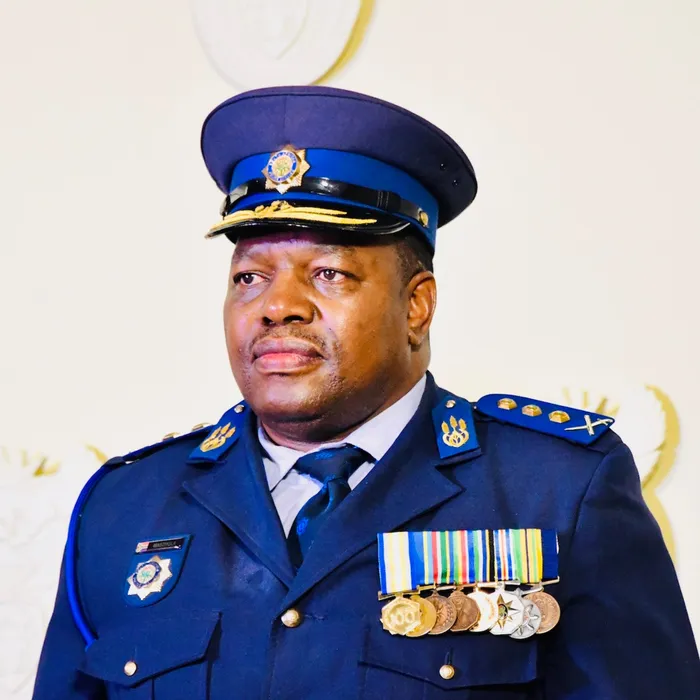Masemola took over PKTT budget after 2022 appointment, says Mkhwanazi

KZN Police Commissioner Lieutenant-General Nhlanhla Mkhwanazi told Parliament's ad hoc committee that National Police Commissioner Fannie Masemola only became responsible for the budget of the political killings task team after assuming office in 2022.
Image: Siyabulela Duda/GCIS
KwaZulu-Natal Police Commissioner Lieutenant-General Nhlanhla Mkhwanazi has clarified that National Police Commissioner General Fannie Masemola only became responsible for the budget of the Political Killings Task Team (PKTT) after his appointment in 2022.
Speaking before Parliament’s ad hoc committee investigating allegations of political interference and internal corruption within the South African Police Service (SAPS), Mkhwanazi explained Masemola’s role in approving and allocating funds for the high-level task team.
Responding to Chief Evidence Leader Advocate Norman Arendse SC, Mkhwanazi said: “When the current National Commissioner took office in 2022, he was not initially the head of the organisation, so he didn’t approve the original budget.
However, he was among those who signed off on the request. Once he assumed the role of National Commissioner, he became the person responsible for allocating funds to the project.”
The committee heard that the task team was formed following President Cyril Ramaphosa’s visit to Pietermaritzburg in May 2018.
However, Mkhwanazi noted that political violence had long been a concern, prompting an earlier directive by then-Police Minister Fikile Mbalula for SAPS to implement extraordinary interventions.
Initially, the team was composed of detectives but was later expanded into a multi-disciplinary unit, including forensic experts, analysts, and Crime Intelligence members.
Over time, concerns of internal corruption emerged. Mkhwanazi told the committee that rotation of team members became necessary after it was discovered that some officers were deliberately omitting key evidence from case dockets to prevent prosecutions.
“Some of the members are carrying dockets, and not because of poor investigation from their side, but it’s a deliberate omission of some of the information that must be in the case docket, so that the case doesn’t go to court,” said Mkhwanazi.
According to the commissioner, these rogue officers were embedded in detective services and were deliberately obstructing justice by removing or failing to include critical evidence in politically sensitive cases. This not only hampered prosecutions but also prolonged the climate of fear and impunity in provinces like KwaZulu-Natal.
“The team had to deal with rooting out rogue elements within its ranks.” he said.
He confirmed that several SAPS members involved in such misconduct were arrested and that many remain in prison. As a result, a rotation policy was introduced to prevent further corruption.
“Quite a number of them to date are still in prison,” he told the committee, adding that corruption extended beyond the SAPS, with “bad apples” also found within the prosecution and possibly even in the courts.
“While detectives assigned to dockets couldn't always be rotated easily, we ensured they worked within a group structure to prevent individual wrongdoing,” Mkhwanazi explained.
Originally, the task team operated on six-month deployments. However, repeated delays in court proceedings,some of which Mkhwanazi suggested were deliberate, led to extensions.
“Perhaps that’s why some of these cases were postponed until after members were due to withdraw,” he added.
Mkhwanazi also revealed that a police officer arrested in connection with the cover-up of the murder of former ANC Youth League secretary-general Sindiso Magaqa was allegedly “working with a parliamentarian” who is still in office.
“A notable one is the one who is now in prison who has been working with a parliamentarian who was involved in the murder of Sindiso Magaqa,” Mkhwanazi said.
Arendse SC acknowledged the gravity of the allegations and raised concerns that the rotation policy implemented for the task team might have also disrupted prosecutions, especially when officers familiar with a case were no longer available when trials resumed.
Mkhwanazi defended the rotation system, saying it was introduced precisely to avoid more officers being “recruited to be paid money” and corrupted in the same way.
“We realised that we cannot then risk to have more members getting corrupted or getting recruited to be paid money. So therefore, it is important we must try by all means to rotate them,” he said.
Still, he conceded that the team had to adapt its model after courts began deliberately postponing cases beyond the deployment end dates of the task team, a move he suggested was designed to weaken prosecutions.
Eventually, SAPS decided to keep the task team active for the full financial year without a set end date. Mkhwanazi said this change led to progress.
“From that point, we began seeing cases being enrolled in court.”
hope.ntanzi@iol.co.za
IOL Politics